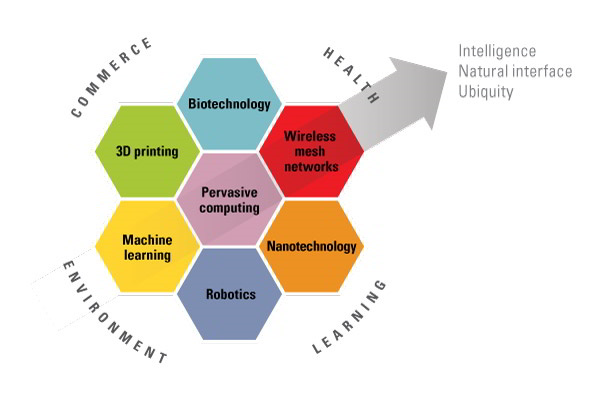 In today’s era of 4th industrial revolution, not embracing technology could be a huge mistake.
In today’s era of 4th industrial revolution, not embracing technology could be a huge mistake.
Be it for any business or human society, technology must be leveraged to alter four key verticals of our world – commerce, healthcare, learning (education), and environment.
In 2017, Bill Gates had recommended trying a career in artificial intelligence (AI), energy or biosciences to make an impact on the society (link) – and of course for excellent job opportunities.
As per the report of MIT Sloan (2018), seven core technologies that are reshaping our lives are pervasive computing, wireless mesh networks, biotechnology, 3D printing, machine learning (and AI), nanotechnology, and robotics (link).

As you can see, apart from machine learning (ML) & AI, biotechnology is also a common thread.
Although ML & AI along with robotics, 3D printing, etc. are gaining more public attention (thanks to bombardment of blogs, news articles, social media posts, and edtech funding), biotechnology is also not too behind.
In fact, with the ongoing COVID-19 pandemic, biotechnology and biosciences are gaining tremendous interest.
Biotechnology and Nanotechnology
In simple words, biotechnology is the use of living systems and organisms to develop or make products.
Related Article: Biotechnology vs Biomedical Sciences vs Biomedical Engineering
Another field which is gaining popularity slowly is nanotechnology. Nanotechnology is the technology that deals with designing and manufacturing incredibly small circuits and devices that are built at the molecular level of matter, typically 1 to 100 nanometers (1 inch = 25.4 million nanometers). Nanotechnology has got applications in alternative energy, electronic devices, medical diagnostics and therapeutics.
Earlier, we have discussed careers and jobs in Bioinformatics – combination of biology & biotechnology and informatics (coding/programming & data science).
Now, how about combining biotechnology with nanotechnology? Sounds interesting, right?
In this article, we will look at the fundamentals of Nanomedicine, its applications, career scope, required qualification & skills, and the top universities around the world.
Careers in Nanomedicine
Career Scope, Eligibility & Top Universities
Introduction to Nanomedicine
The recent times have undermined our abilities to be technologically advanced as the promises to revolutionize drug delivery, diagnostics, gene therapy, and other areas of research and development are still unfulfilled.
There is an increased demand for an efficient workforce in the field of Nanotechnology as it has the potential to transform medicine, in the research lab and the clinic.
What is Nanomedicine?
Nanomedicine involves the application of Nanotechnology in medical therapies and developing nanoscale agents for the remedy of several kinds of diseases.
Nanotechnology means manipulation of an object at the atomic and molecular level to generate substances with exceptionally different and unique properties.
Students in this career field have distinguished interdisciplinary knowledge. They are qualified to use their nanotechnology abilities in the practical industry, have consulting careers or even use it in future training of MD, PhD, or MD/PhD programs.
Key Applications of Nanomedicine
Nanomedicine as its branches spread in a multitude of areas like drug delivery, diagnosis and imaging tools, high-throughput screening platforms, vaccine development, antibacterial medicines, wearable devices, etc.
Nanomedicine also involves extensive use of biological, nonbiological, biomimetic, or hybrid materials.
For medical purposes, nanomedicine has a primary share in three different areas: Diagnosis (Nanodiagnosis), controlled drug delivery (Nanotherapy), and regenerative medicine.
The world is also seeing a new area that is rapidly gaining popularity in the medical world. It combines the fields of diagnostics and therapy into a new area called Theranostics. It is rising as a promising approach with an unmatched future in the field of medicine.
Nanomedicine is also holding assuring advances in clinical practice by the introduction of novel regenerative medicines for both diagnosis and treatment.
Several developments in this field are now beginning to translate into clinically viable products. Few of them include.
- Smart Pills – The Smart Pill and Pill Cam technology is an ingestible sensor pill that has wireless connectivity. The capsule would adjust the dosage of a selective drug based on data inferred in the body. This product also benefits people who have schizophrenia and bipolar disorder.
- Cancer Treatment – As the conventional chemotherapy and radiation treatments come with some collateral damage, the field of Nanomedicine is working on nanoparticles to target cancer cells in specific.
- Diagnostics – Nanoscale sensors, when embedded directly into the affected area, could identify infection much sooner. It would thus be more feasible to administer treatment to an infected area at the first sign of infection with the help of targeted drug delivery.
Demand and Career Scope of Nanomedicine
A career in Nanomedicine demands robust formal learning in diverse fields. These courses include nano-techniques and instruments, nanomaterials, nanofabrication, microbiology, and nanotechnology safety.
Further, some degree programs require that the students should complete internships in nanotechnology. Also, nanotechnologists serving as medical scientists need to have a Medical degree, Ph.D., or even both.
When you decide to take up the field of nanomedicine, there are a variety of professional paths that you can take up.
There may however be a question in your mind regarding what career path would be right for a budding scientist, particularly in the context of comparing industry and academia.
A vast majority of students prefer a job in the industry and not in academia due to the increasing demands.
You can follow and practice Nanomedicine in academies and several laboratories. You don’t have to limit your opportunities to find a job only in big companies. You can approach some medium and small-sized companies that give exceptional possibilities to perform research.
Companies like Houston Methodist (Research Administrator), Pfizer (Formulation Scientist, Nanoparticles), Hackensack Meridian Health (Postdoc Research Fellow, Immuno-Bioengineering), The National Institutes of Health (Intravital Microscope Postdoc Fellow Position), and many more offer exceptional jobs in the US.
Europe has companies like – Institute AMOLF in Amsterdam (Postdoc studies), Ikerbasque in Bilbao, Spain (Research Professor in Nanostructured Materials, Tyndall National Institute in Cork, Ireland (Researcher – Fabrication of III-Nitride NanoElectronic Devices, EPFL in Lausanne, etc.
A significant amount of universities and laboratories in China and Australia also welcoming new scientists that are hungry for experience and knowledge.
Here are some exciting fields you can look out for in nanomedicine:
- Developing contrast agents for cell imaging in which cadmium selenide and glowing nanoparticles treat tumours by glowing and offering guidance for accurate tumour removal.
- Therapeutics for cancer treatment which involves nanoshells that can unite with cancerous cells and advance them to their death.
- Promoting and developing nanoelectronic biosensors like diagnostic devices, drug delivery vehicles, and neuro-electronic interfaces.
- Tissue repair in which nanomedicine can substitute prevailing treatments like organ transplants or artificial implants.
Required Qualifications and Skills
Ideally, you need a Bachelor degree in pure or applied science, biosciences or biotechnology, or engineering (Mechanical, Electrical or Systems Engineering).
To make it into core research, a Masters (Nanomedicine, Nanotechnology, Nanoscience, Materials Science, Biomedical Engineering/Science, Biophysics, Biotechnology or Pharmaceutical Sciences) and/or PhD is essential.
An individual should have certain specific skills for managing his/her nanomedicine career. Here are some skills that in general, apply to all fields together.
Besides an excellent working knowledge in prime fields of work (biology, medicine, nanotechnology), you may need skills like:
- Logical thinking
- Numerical skills
- Systematic approach and analysis
- Teamwork
- Writing skills
- IT skills
- Good communication skills
- Presentation skills
- Productive time and resource management
- Effective financial management
Best Masters Programs in Nanomedicine Abroad
At Masters level, there are not too many programs as MSc/MS Nanomedicine since it’s a pretty emerging field. As discussed above, you can choose to do your Masters in any relevant & closely related field with a focus on Master’s thesis in nanomedicine.
Below are some of the top universities that offer Masters (MS/MSc) in Nanomedicine or a very closely related area.
University of Oxford
University of British Columbia
Boston University
Northeastern University
University College London
Newcastle University
University of Pennsylvania
University of Waterloo
University of Otago
KTH Royal Institute of Technology
Tampere University
Swansea University
University of Southampton
University of South Florida
RMIT University
University of Glasgow
Lund University
Chalmers University of Technology
Please note that the above universities are not in any particular order of ranking.
Top Universities for Doctoral Studies & Research in Nanomedicine Abroad
Here are some universities having the highest academic reputation, employer reputation, and research impact all over the world.
- Massachusetts Institute of Technology (MIT) – United States
- Stanford University – United States
- University of California, Berkeley (UCB) – United States
- University of Cambridge – United Kingdom
- University of Oxford – United Kingdom
- Northwestern University – United States
- Imperial College London – United Kingdom
- National University of Singapore (NUS) – Singapore
- Nanyang Technological University, Singapore (NTU) – Singapore
- University of Oxford – United Kingdom
- Georgia Institute of Technology – United States
- Tsinghua University – China (Mainland)
- Harvard University – United States
- University of Illinois at Urbana-Champaign – United States
- The University of Tokyo – Japan
- ETH Zurich – Swiss Federal Institute of Technology – Switzerland
- University College London – United Kingdom
- University of California, Los Angeles (UCLA) – United States
- EPFL – Switzerland
- California Institute of Technology (Caltech) – United States
- KAIST – Korea Advanced Institute of Science & Technology – South Korea
- University of California, Santa Barbara (UCSB) – United States
- Seoul National University – South Korea
- The University of Manchester – United Kingdom
- Tokyo Institute of Technology (Tokyo Tech) – Japan
- Carnegie Mellon University – United States
- University of Waterloo – Canada
- Kyoto University – Japan
- The University of New South Wales (UNSW Sydney) – Australia
- University of Michigan-Ann Arbor – United States
- Pennsylvania State University – United States
- University of British Columbia – Canada
- RWTH Aachen University – Germany
- Peking University – China (Mainland)
- University of Sydney – Australia
- University of Twente – Netherlands
Please note that the above universities are not in any particular order of ranking.
Final Thoughts
The application of nanotechnologies in a healthcare environment offers a wealth of opportunities for improved diagnosis and treatment that would previously have been impossible.
Nanomedicine is a relatively new sector of the health industry that sits on the cutting edge and is likely to grow considerably over the next few years. It’s not hot as bioinformatics or data science (yet).
However, it could be wise to enter a career that’s going to be hot in a few years; just like what bioinformatics, genomics, data science or business analytics used to be 5 – 10 years back.
Key References:
1, 2, 3, 4, 5, 6